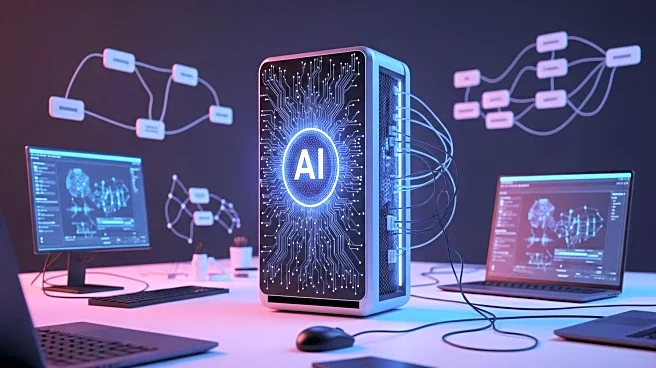What's Happening?
Tesla has strategically shut down its ambitious AI supercomputer project, Dojo, which was intended to train neural networks for full self-driving technology. Despite six years of development, the project was disbanded in August 2025, with Tesla now focusing on partnerships for chip development, including a $16.5 billion deal with Samsung for AI6 chips. The departure of key personnel, including Dojo's lead Peter Bannon, contributed to the shutdown. Tesla's focus has shifted to Cortex, another AI training supercluster at its Austin headquarters, marking a pivot from self-reliant hardware to collaborative AI development.
Why It's Important?
The shutdown of the Dojo project signifies a major shift in Tesla's approach to AI development, moving away from high-risk, self-reliant projects to more collaborative partnerships. This change could impact Tesla's position in the autonomous vehicle market, as the company adapts its strategy to leverage external expertise and resources. The decision may also influence the broader AI industry, as other companies consider similar strategic shifts to balance innovation with practical development challenges. Tesla's partnership with Samsung highlights the growing importance of collaboration in advancing AI technology.
What's Next?
Tesla's focus on Cortex and partnerships for chip development suggests a continued commitment to advancing AI capabilities, albeit through different means. The company may explore further collaborations with tech giants to enhance its AI infrastructure and maintain competitiveness in the autonomous vehicle sector. The departure of key personnel could lead to new ventures, such as DensityAI, potentially contributing to the AI ecosystem. Stakeholders will likely watch Tesla's next moves closely, assessing the impact of its strategic shift on the company's innovation trajectory and market position.
Beyond the Headlines
Tesla's decision to shut down the Dojo project raises questions about the sustainability of ambitious tech projects and the balance between innovation and practical execution. The move reflects broader industry trends towards collaboration and resource sharing, as companies seek to mitigate risks and optimize development processes. The ethical and cultural implications of such strategic shifts may influence how tech companies approach AI development, potentially reshaping industry norms and expectations.









